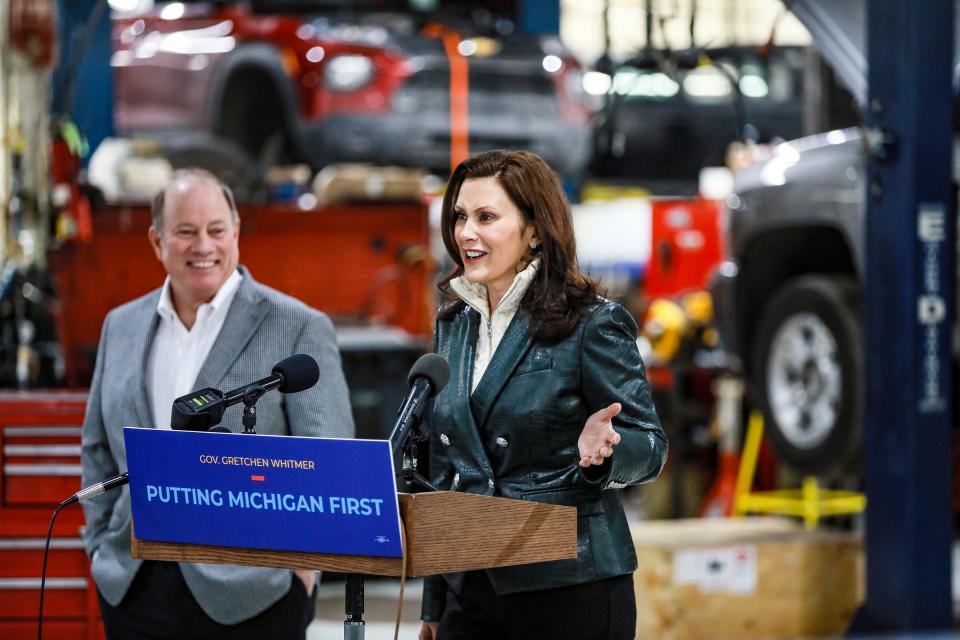Michigan's $400 auto insurance refund likely to bring out scammers: What to watch for
Michigan drivers will be looking for that $400 check in the mail and scammers will, no doubt, open up some financial potholes along the way.
Get ready for the fake texts, the phony emails, social media posts, and phone calls claiming to need personal information from you right now to issue the auto insurance-related refunds in Michigan, according to an alert from the Better Business Bureau Serving Eastern Michigan and the Upper Peninsula.
The texts and emails could look legitimate, maybe even as if they are from your insurance company. They're not.
Ignore. Delete. Ignore. Repeat.
Scammers reach out when we're confused
Drivers do not have to take any action to get their money. But scammers will likely make you think otherwise.
"Remember," the BBB warns, "you do not pay money to receive this check. This money is being given for free to all Michiganders who had auto insurance as of Oct. 31, 2021. If you receive a message from anyone claiming that you must pay money to receive your check, it is a scam."
This auto insurance refund in Michigan isn't an everyday kind of a thing. We all can be confused by what's happening and when. But there are plenty of legitimate online sources that give lots of details.

The Michigan Catastrophic Claims Association, a fund controlled by the insurance industry, transferred a $3 billion surplus to Michigan’s auto insurers in early March.
The transfer triggered a 60-day deadline that requires auto insurers — not the state — to send out required $400 refunds per vehicle to eligible Michiganders no later than May 9.
"A refund check or an ACH deposit will be issued to eligible Michigan policyholders," according to an FAQ from the Michigan Department of Insurance and Financial Services.
"If you are eligible to receive a refund, it will be sent to you by your insurance company and you will not have to do anything to receive it."
More: $400 Michigan auto insurance refund is coming: 8 key questions you might have
More: Vladimir Konstantinov's caregivers fear he could be forced into a nursing home
The refund will be $400 per eligible car or motorcycle. "For example, if you had auto insurance policies for two cars as of 11:59 p.m. on Oct. 31, 2021, you will receive a refund of $800," the FAQ states. "The refund is $80 per historical vehicle."
What if you moved? Or switched banks? Well, your insurance company will send your refund via check or via a direct deposit to your bank account based on the information it has on record. If you have moved, contact your insurance company to update your information.
Will auto refunds trigger scams like stimulus did?
Fraudsters, though, can be expected to drive up our anxiety.
Con artists tried to trick consumers during the massive rollouts for federal stimulus payments. Text messages or emails said things like "you are eligible for more COVID relief money, click here to claim it,” according to Ashley Gibbard, marketing manager for the BBB in Michigan.
The local BBB received at least 13 such reports relating to some sort of stimulus check scam. No one in this group reported losing money, Gibbard said, but one person gave away some personal information.
Stimulus scams flowed as freely as the cash during the pandemic.
More: Survey scams offer free items, hide behind big names: The No. 1 red flag
More: Scammers go after lucrative tax credits, use new tricks to file fake tax returns
The Federal Trade Commission, for example, warned early last year to be on the lookout for stimulus-related emails that supposedly were being sent by Joseph Simons, who was then the FTC chairman. That email included a "certificate of approval" for your stimulus cash and demanded that you pay taxes up front to receive the money.
So far, no reports have been made involving auto insurance refunds.
“Scammers are very savvy, and when you have a large group of consumers waiting for a payment to come, this is a great opportunity for them to try and fool people into giving out their personal information,” said Melanie Duquesnel, president & CEO of the Better Business Bureau of Detroit and eastern Michigan, in a statement.
She noted that if you want a refund directly deposited into your bank account, contact your insurer directly.
How to avoid getting scammed
The BBB's tips for avoiding a scam:
If you are contacted, stay calm and don't act immediately, no matter how dramatic the story is.
Don’t respond to unknown calls, texts or emails. If you think the message may be real, contact your insurance provider directly.
Be on the lookout for look-alikes. Scammers hide behind well-known names and often spoof existing company names, websites and caller IDs. Call your insurer directly if you think that is necessary.
Contact Susan Tompor via stompor@freepress.com. Follow her on Twitter @tompor. To subscribe, please go to freep.com/specialoffer. Read more on business and sign up for our business newsletter.
This article originally appeared on Detroit Free Press: Michigan's $400 auto insurance refund likely to bring out scammers

